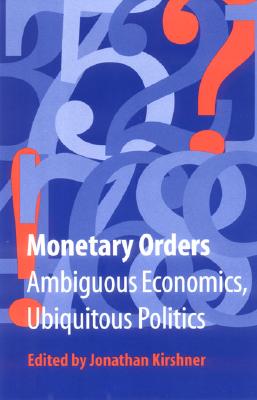

 Cornell University Press
Cornell University Press
Monetary Orders


Key Metrics
- Jonathan Kirshner
- Cornell University Press
- Hardcover
- 9780801440601
- 9.46 X 6.28 X 1.05 inches
- 1.39 pounds
- Business & Economics > Money & Monetary Policy
- English
 Secure Transaction
Secure TransactionBook Description
Wherever there is money, there is money politics-a subject demanding ever greater attention at a time when monetary policies lead and the real economy follows. A principal defining characteristic of the contemporary global economy, Jonathan Kirshner contends, is the rise and preeminence of monetary phenomena--international financial crises, Central Bank Independence and inflation fighting, the creation of the euro, and monetary reform in emerging economies, to name only a few. Moreover, unlike most debates in political economy (such as those regarding trade policy), which are generally recognized as political, monetary phenomena and macroeconomic policies are typically represented as expressly apolitical. In Monetary Orders, a distinguished group of scholars explores the inescapable political origins of choices about money.
The essays in Monetary Orders each address a specific issue or puzzle relating to money and its management. Their authors focus on markedly disparate cases but share a common observation: for most policy choices about money, market forces and economic logic can rule out certain options, but are indeterminate in explaining why one policy rather than another will be chosen. Ultimately, political factors are essential to explain fundamental and consequential choices about money.
Author Bio
Jonathan Kirshner is Professor of Political Science and International Studies. His research and teaching interests focus on international relations, political economy (especially macroeconomics and money), and politics and film. His current research includes projects on classical realism, the international political implications of the financial crisis and its aftermath, and the politics of mid-century cinema.
Prior to joining Boston College, Kirshner was the Stephen and Barbara Friedman Professor of International Political Economy in the Department of Government at Cornell University. At Cornell, he also served as director of the Reppy Institute for Peace and Conflict Studies from 2007 to 2015, and was the recipient of the Provost’s Award for Distinguished Scholarship and the Stephen and Margery Russell Distinguished Teaching Award.
Recent books include American Power after the Financial Crisis, and Hollywood’s Last Golden Age: Politics, Society and the Seventies Film in America. His first book, Currency and Coercion, explored how states manipulate international monetary relations to advance security-related goals. Another book, Appeasing Bankers: Financial Caution on the Road to War, illustrated how financial interests (such as banks) and international financial markets can shape and constrain states’ grand strategies and influence decisions about war and peace. Appeasing Bankers won the best book award from the International Security Studies Section of the International Studies Association.
Kirshner was the first World Politics Visiting Fellow at Princeton University’s Institute for International and Regional Studies, and was the director of the Economics and National Security Program at the Olin Institute at Harvard University from 2000-04. With Eric Helleiner, he is the co-editor of the multi-disciplinary book series “Cornell Studies in Money,” as well as the books The Great Wall of Money: Power and Politics in China’s International Monetary Relations and The Future of the Dollar.
Source: Boston College
Videos










Community reviews
Write a ReviewNo Community reviews